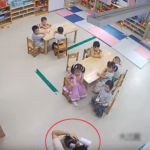One possible reason for this behavior could be that children face a lot of pressure at school or in their social relationships with friends and family. When they come home, they may feel the need to “release” these negative emotions and often choose to express them to the people closest to them, their parents.

Illustration photo.
If parents often express irritability or dissatisfaction, children unconsciously see this as a normal way of behaving and imitate it. Therefore, first of all, parents should encourage children to share their emotions and feel safe to open up more easily.
When parents understand the causes of this situation and apply appropriate solutions, it will help improve family relationships. Love and understanding from parents will be the foundation for children’s emotional and character development, creating a healthy and happy environment for the whole family.

Psychologist Quang Thi Mong Chi.

Is the content of this behavioral specialist’s letter a reflection of the child’s unfilial character?
The fact that children have strong reactions and speak disrespectfully to their parents, especially when it only happens within the family, does not mean that they are “unfilial”. In psychology, we view this as a behavioral expression, not a moral judgment of a person based on a single moment or a temporary phase.
In many cases, children may behave gently with outsiders but are tense and easily explode with their parents. This reflects a familiar relationship that makes children feel “safe” to reveal negative emotions – even in inappropriate ways. In other words, sometimes children don’t restrain their emotions with their parents, not because they hate them, but because they believe they will still be accepted, even when they are angry.
However, if the behavior of being irritable and rude occurs frequently and tends to devalue and deny the sacrifices of the parents, then it is a sign that needs attention. At this point, instead of labeling it as “unfilial” – which is judgmental and can push the relationship further apart – parents should find out the deep cause: Is the child harboring hurt? Is there something that hasn’t been said? Or is there a lack of sincere communication in the family relationship?
Respecting parents is an important value in Asian culture, but to nurture this, it needs to be built on affection, listening, and mutual support. Calling it “unfilial” doesn’t solve the root cause, but can push children further away.
On the contrary, when parents take the initiative to connect, understand and are willing to adjust their communication methods, children will also gradually learn to express love and respect in a healthier way.

How should parents react when their children are irritable so as not to make the situation worse?
When children are irritable, the most important thing is for parents not to respond with the same level of emotion. Many parents tend to scold or reprimand their children immediately because they feel insulted, but reacting in this way usually only escalates the conflict.
Instead, parents need to stay calm and practice a “psychological pause” to temporarily suspend their reaction and give themselves time to think and adjust their emotions.
Lowering your voice and maintaining a calm attitude will not only soothe the situation but also show children a mature model of behavior. In addition, parents should acknowledge the child’s emotions but not condone inappropriate behavior. For example, you can say: “I understand that you are angry, but you should not talk to me like that.”
This way of speaking helps children realize that their emotions are recognized while still understanding that there are limits to how they are expressed. After the situation has calmed down, parents can choose another time to have a serious conversation, listening to the child without judgment: “How did you feel then? Was there something that made you uncomfortable?”
More importantly, parents need to establish clear boundaries in communication: children can disagree and be dissatisfied, but they are not allowed to use offensive language. This principle must be consistently maintained, and parents should also set a good example in the way they communicate with their children. In addition, find out the deep cause behind the irritable behavior, which may be due to academic pressure, psychological stress, feeling abandoned or not understood.
When parents pay attention to these underlying needs, children will gradually change the way they express their emotions and learn to connect instead of confront. In summary, instead of seeing irritable behavior as “rudeness” that needs to be suppressed, parents should see it as an opportunity to teach their children how to regulate their emotions and build healthy communication. If this situation persists and negatively affects the relationship, the family can seek help from a psychologist for timely support and accompaniment.

How should parents communicate to help children understand the value of love and family, as well as filial piety with their parents?
Love and filial piety in the family cannot be taught only through parental teachings or unilateral expectations, but must be nurtured through sincere, consistent, and emotionally connected communication. Children can only understand and absorb these values when they feel unconditionally loved, respected, and listened to as truly valuable family members.
To do this, first of all, parents need to set an example in their daily behavior and interactions. Small actions such as listening when a child speaks, apologizing when a parent makes a mistake, or expressing gratitude to each other among family members are ways to sow the seeds of respect and love. When children live in an environment where parents also listen to and respect each other, they will naturally learn to behave in the same way.
Communication should be built on a spirit of companionship, not control. Instead of giving orders or imparting moral lessons, parents can start by sharing their personal feelings sincerely: “Dad is very sad to see you get angry with your mother today. Your mother has been worried about you all day.” Sharing in this way helps children understand the emotional consequences of their actions, thereby developing empathy.
In addition, telling family stories and the silent sacrifices of parents and grandparents – without a sense of entitlement or guilt – is also an effective way to arouse gratitude and filial piety. Children will realize that they are part of a stream of love and responsibility between generations, not just beneficiaries.
Most importantly, parents need to create a safe and positive space for regular communication, where children feel comfortable expressing their emotions, both positive and negative, without judgment. When love is expressed consistently and authentically through daily communication, the value of filial piety will not need to be taught through words – it will naturally form as part of a mature personality.
“The 3 Rules for Success: A Parent’s Guide to Shaping Their Child’s Future”
Introducing the art of discipline: a delicate dance of guidance and freedom. It’s an essential aspect of parenting, a fine balance that empowers children to explore their world within healthy boundaries. Effective discipline is about teaching and nurturing, a gentle yet firm approach that guides our little ones towards understanding consequences and making thoughtful choices. It’s an art that every parent can master, fostering a loving and respectful environment for their children to thrive.
Why Won’t Mom Let Me Play With Her Phone? A Guide for Curious Kids.
“Screen time and kids: a delicate balance for parents to navigate. It’s an all-too-familiar scenario: your child, glued to the phone or tablet, seemingly oblivious to the world around them. As a parent, your natural instinct might be to worry about the impact of this on their development. But how you respond matters; it will shape their relationship with technology and influence their growth.”



































